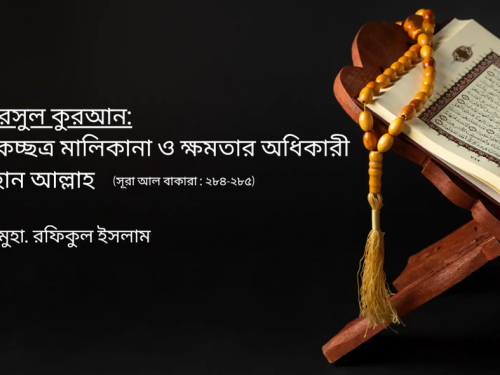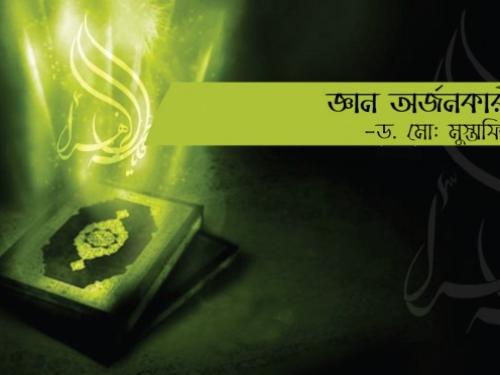Challenges
Iblis or Satan
Allah says (Surah Al-Hijr: 39):
قَالَ رَبِّ بِمَآ أَغۡوَيۡتَنِي لَأُزَيِّنَنَّ لَهُمۡ فِي ٱلۡأَرۡضِ وَلَأُغۡوِيَنَّهُمۡ أَجۡمَعِينَ
[Iblis] said: “My Lord! Because You have led me astray, I will surely beautify things for them on the earth, and I will surely mislead them all.”
Iblis is our eternal enemy. He challenged Allah and swore to mislead mankind into Hell. He influences our thoughts, minds, and souls. Every action we take stems from two places: the mind (thought) and the conscience (soul).
People are generally of three types:
First type: Both mind and soul are controlled by Iblis.
Second type: The mind is influenced by Iblis, but the soul is still under one’s control.
Third type: Both mind and soul are under one's own control — these are the true believers.
Our challenge is to become the third type of people — those who are free from the interference of Iblis.
Conquering the Self (Nafs)
The Prophet ﷺ said:
“We are returning from the lesser jihad (battle) to the greater jihad.”
The companions asked: “What is the greater jihad?”
The Prophet ﷺ replied: “The struggle against one’s own self (nafs).”
(Al-Bayhaqi, Az-Zuhd)
The nafs refers to our evil inner desires. When someone becomes a slave to their desires, they easily fall into sin. Many of us fail to control our nafs — we crave more, want to enjoy more, and find forbidden things attractive.
Many of us watch obscene videos, indecent films, stare at women, gossip, backbite, and break promises — all signs of being slaves to our desires.
A sincere Muslim must govern their nafs with the light of the Qur’an, engage their heart in the remembrance of Allah, and strive to bring their eyes, ears, mouth, and hands under the command of Allah.
Social Media
In today’s world, platforms like Facebook, TikTok, and YouTube have taken over a major part of our lives. We spend hours watching videos, posting unnecessary things, and peeking into others’ private lives. All of this wastes our time, corrupts our hearts, and weakens our faith.
A Muslim youth should use social media sparingly and only for religious or beneficial purposes.
Family and Friends
Those closest to us — like parents, spouse, siblings, relatives, and friends — can sometimes divert us from the right path, especially if they are weak in religious understanding.
Often we engage in haram to please our families. If our friends are steeped in atheism, disobedience, or worldly desires, they can destroy our faith too.
We must build a family and friend circle that pulls us toward the mosque, encourages learning the Qur’an, and helps us remain steadfast on the straight path.
Crisis of Faith and Identity
In today's secular and materialistic world, many young Muslims face a crisis about their religious identity. Some people question your name, criticize Islam, and even Muslims themselves feel ashamed of their identity.
This is a sign of weak faith and lack of self-awareness.
We must proudly say: “We are Muslims.” We are servants of Allah, followers of the Prophet ﷺ. Our identity is not defined by a passport, but by iman (faith).
Morality and Technology
Modern technology has brought many opportunities — but also great dangers, especially concerning morality.
Youth today are addicted to phones, internet, video games, virtual reality, AI, and more — leading them away from real life and religious practice.
A Muslim youth should use technology for Allah’s pleasure: listening to Qur’an, watching Islamic content, doing online da’wah, reading Islamic books, etc.
Watching haram content, getting lost in gaming, watching pornography, or endless scrolling at night destroys our faith.
Allah will question us about what we did with our eyes, ears, and hands — so let technology be a blessing, not a path to sin.
Islamophobia
Islamophobia means spreading fear or hatred against Islam and Muslims.
In many Western countries, Muslims are targeted — because of their clothing, names, or even for reading the Qur’an.
Media, movies, and politics often associate Islam with terrorism, backwardness, or oppression of women.
As a result, many young Muslims feel ashamed to show their faith — afraid to wear hijab or grow a beard, some even change their names.
This is tragic. A Muslim must bravely hold onto their faith and identity.
The Prophet ﷺ was mocked, called a madman, a poet, a sorcerer — yet he never abandoned the truth. We too must proudly uphold our identity as believers.
Knowledge and Education
When we talk about knowledge, we don't just mean worldly degrees or jobs — religious knowledge is equally important.
Today’s youth are earning degrees in schools and universities but don’t understand the Qur’an, know no hadiths, and don’t pray properly. This is an imbalance.
Allah says (Surah Mujadila: 11):
“Allah will raise in rank those among you who believe and those who are given knowledge.”
We must gain knowledge in both deen and dunya. A true Muslim can be a doctor, engineer, businessman, or teacher — but must be firmly grounded in Islamic values.
Society and State
Today’s world promotes a society where haram is made to look halal, evil is normalized, and fear of Allah is mocked.
In such a society, it becomes extremely difficult to maintain one’s faith.
Moreover, many governments ban Islamic laws, stop Qur’an education, ban hijab, and imprison scholars — leaving little room for youth to learn their religion.
Muslim youth must strive to change society — starting with changing themselves, then their family, and finally working to establish justice in society.
When we study the lives of the Prophet ﷺ and the Sahabah, we see how they changed an entire nation within just 23 years.
Confusion, Rumors, and Misinformation
Today’s online platforms make it difficult to distinguish truth from falsehood. We often share fake videos, images, or news. Some people give false fatwas in the name of Islam; others declare fellow Muslims as disbelievers.
These misguided ideas harm our faith.
Allah says (Surah Hujurat: 6):
“O believers! If a rebellious person brings you any news, verify it...”
We must verify information, seek Qur’an- and hadith-based knowledge, and learn from authentic Islamic scholars.
Palestine
Palestine is the land of Al-Aqsa, the first Qiblah of Muslims.
For decades, our Muslim brothers and sisters there have been tortured, martyred, and displaced — while much of the Muslim world remains silent.
Youth should stay informed about Palestine, make du’a, donate, learn its history and struggle, and stand in solidarity with them.
Palestine is not just a piece of land — it is a test of our iman.
What We Must Do
Strengthen Our Faith
The greatest treasure in a Muslim’s life is iman (faith in Allah).
The stronger our iman, the more we can face life’s challenges, sins, Satan’s tricks, and pressure from society.
To strengthen our iman, we must recite the Qur’an regularly, establish prayer, stay in Allah’s remembrance, and stay engaged in good deeds.
The Prophet ﷺ said:
“Iman wears out in your hearts just like clothes wear out. So ask Allah to renew the iman in your hearts.”
(Tabarani)
Let us build a faith that is not just on the tongue, but deep in the heart — and reflected in our daily life.
Learn and Follow Qur’an and Hadith
A Muslim’s most important duty is to know and follow Allah’s message (Qur’an) and the teachings of the Prophet ﷺ (Hadith).
Today many young Muslims spend hours on TikTok, YouTube, and games — yet don’t understand the Qur’an, have not memorized any hadiths, or know nothing about the Prophet’s life.
This is truly heartbreaking!
The Qur’an is Allah’s personal letter to us. Hadith is the biography of our beloved Prophet ﷺ.
In these two sources lies the solution to all of life’s problems — career, relationships, mental health, and society.
Allah says:
“This is a Book We have revealed to you so that you may bring people out of darkness into light.”
(Surah Ibrahim: 1)
Start reading the English translation of the Qur’an 5–10 minutes daily, learn hadiths — your worldview will change, InshaAllah.
Follow the Example of the Prophet ﷺ
True love is shown through following. If we truly want to be Muslims, we must take the life of the Prophet ﷺ as our model.
He was the ideal leader, husband, father, businessman, caller to Islam, and the most beloved servant of Allah.
In him lies the perfect example.
Allah says:
“Indeed in the Messenger of Allah you have a beautiful example (Uswah Hasanah).”
(Surah Ahzab: 21)
Muslim youth should be inspired by his courage, patience, mercy, trustworthiness, and humility — and build those qualities in themselves.
Learn his life, love him, and follow him — this is the path to true success.
Gain Both Religious and Worldly Knowledge
Islam is not just a mosque religion — it is a complete way of life.
So a Muslim should not just learn how to pray or fast — but must be proficient in both religious and worldly knowledge.
Whether you are a doctor, engineer, designer, entrepreneur, or teacher — you must have sound Islamic understanding to know halal/haram, call others to deen, and live to please Allah.
Ibn Taymiyyah (رحمه الله) said:
“One who gains religious knowledge without worldly knowledge is incomplete; and one who gains worldly knowledge without religious knowledge is misguided.”
So balanced knowledge is the true identity of a Muslim youth.
Choose Good Company and Environment
People around us influence our lives and thoughts the most.
If you stay with righteous, God-fearing friends, they will pull you toward prayer, dhikr, and the path of deen.
If you stay with heedless, sinful, atheist, or dishonest friends — you’ll slowly become like them, perhaps without even realizing it.
The Prophet ﷺ said:
“A person follows the religion of his close friend. So be careful whom you befriend.”
(Tirmidhi)
Youth should choose friends who support them in both this life and the hereafter.
Join Islamic study circles, make friends at the mosque, and encourage one another in good.
You Are Not Just Anyone — You Are a Noble Muslim
Dear young brothers and sisters, remember — you are not ordinary. You are part of a great nation called "Muslim" — one who submits to Allah and obeys His commands.







